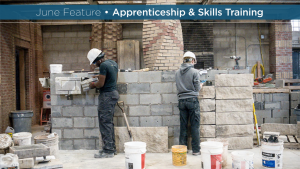Can online delivery of skill competitions, training and assessments be effective?
That was the topic of the second session of the WorldSkills Conference Talks held online July 1. WorldSkills members shared their experiences, approaches and solutions to dealing with the COVID-19 pandemic and the pros and cons of moving to a virtual format.
“We have to keep students engaged,” said Jason Scales, business manager, education with The Lincoln Electric Company. “This conversation is more about how is the paradigm shifting, how long is it going to last and what are the long-term effects on training, competition and skills development? I think it’s going to move to a blended approach. We’re still going to engage in online learning but there still has to be that hands-on development of skills.”
Canada was one of the first to run skills competitions online when the pandemic hit with provinces and territories hosting skills at home challenges and virtual competitions.
“Similar to what you have to do in organizing the usual competition, you need to have willing partners, you need to have strong technical experts that can build challenges that can be evaluated and you need to have interested participants,” explained Shaun Thorson, CEO of Skills Canada.
“An interesting element that we learned with those competitions is there was now a lot more direct connection to students. In our usual competition format we worked through teachers and coaches.”
One concern, he said, is “typically people interested in vocational education or careers really like to do things with their hands and they don’t typically want to be sitting behind a desk.”
While online competitions can attract a larger audience, it is dependent on the ability to access digital tools which can be a challenge in some jurisdictions in the country and around the world.
“If you do have that infrastructure in place you potentially have a larger group of young people that you can access and that can get involved in these competitions because you are not as limited by the costs and time restrictions that it takes for people to travel to a central location,” said Thorson. “I don’t think anything can replace the excitement of face-to-face competition.”
Ranjan Choudhury, senior head at WorldSkills India, National Skill Development Corporation, said his primary concern is keeping young people engaged and motivated online.
“What keeps me up at night is how to get the entire training paradigm onto a virtual platform, if it can be done and how much of it would still require hands on,” he stated.
“When the pandemic first hit we were planning how can we move virtual both in terms of training and competition. We decided, at least in the interim period, to do an outreach through social media to keep the competitors who were signed up engaged and to create awareness.
“What was very remarkable was that over a two month period we got 3.7 million impressions.”
Like Russia and Canada, India is challenged with a large geography.
“There is asymmetry of information, there is asymmetry of training opportunities, so the easiest way to reach out is online,” Choudhury added. “I think the longer term learnings from this will be important going forward not only for us in India but also for most countries in terms of efficiency and efficacy.”
Moderator Ekaterina Loshkareva, board member and in strategic development with WorldSkills International, said Russia will host the national final this year in September.
“Experts will be all together in the expert control centre while the competitors, they’re going to stay within their region and respecting all the security and health and social distancing. They will come to the certified WorldSkills Russia centres in the region,” she explained. “They are going to be connected to experts via cameras and in those skills where you physically cannot assess the results based on just video we are actually going to use express mail to send the results of their work to the expert centres so the experts can see and assess it physically as well.”
Scales talked about how to deal with virtual training and assessment in the welding community.
“When we look at the competitions there has to be accountability. There also has to be a degree of integrity with that skill. So using videos in the welding booth, livestreaming over the internet where judges can actually see the students or participants welding is going to be key,” said Scales.
He described this time as “the great awakening.”
“When you think about skills development, we always thought it had to be face to face, onsite, we couldn’t transfer knowledge unless they were in the classroom or in the welding booth,” he explained. “It’s going to be very different when we come out of this post-COVID. I think of how we use simulation, virtual reality, augmented reality.
“I don’t know if any of us have the right answer right now and I think we’re experimenting with a lot of different ways to assess a certain skill and transfer the knowledge to the participants wanting to learn.”
Some skills are more of an art, Scales pointed out.
“Becoming proficient in welding takes time, it takes a coach and it takes somebody with a mastery of that skill to help that learner develop that proficiency,” he said. “We can’t take that away.”
Victoria Levin, a senior economist and global lead for skills, education and global practice at World Bank Group, said the preliminary findings of a joint survey by World Bank, the United Nations Educational, Scientific and Cultural Organization and the International Labour Organization were recently released.
“While COVID-19 definitely presented multiple challenges to TVET (technical and vocational education and training) institutions around the world, particularly in low income countries, many institutions and systems have risen to these challenges and they are contributing to fighting the pandemic but also helping students continue on their learning trajectory.”
Follow the author on Twitter @DCN_Angela.











Recent Comments
comments for this post are closed